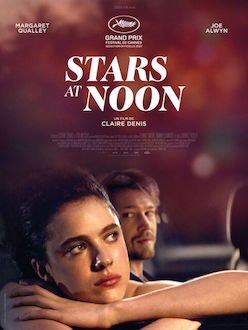Direction: Claire Denis
Country: France / Panama / other
French director Claire Denis, who gave us unique moments of cinema with Beau Travail (1999), White Material (2009) and High Life (2018), based herself on the 1986 novel The Stars at Noon by Denis Johnson for this new drama/thriller of the same name. In it, a young American journalist, Trish (Margaret Qualley), is stranded in Nicaragua with no money and no passport. To survive, she resorts to a police subtenant (Nick Romano) and the vice-minister of tourism (Stephan Proaño), to whom she offers sexual favors in exchange for money. With important elections approaching, they promise to help her leave the country but with no practical effect. That’s when she meets Daniel (Joe Alwyn), an English businessman working for an oil company. This man could be her last chance or her ruin.
Stretched to two hours and a half, this monomaniacal film is sporadically intriguing, yet its overweening cynicism leaves a curdled aftertaste. There’s lack of detail in the political and corporational considerations and the romance is too indolent to convince. The actors, who are not to blame, sink into the swamp of good intentions because the film sort of trivializes what would be a terrible reality.
By generating some cheesy and sticky do-or-die tension, Denis makes it hard for us to take this story seriously. The thrills are not strong enough to push us to the edge of our seat. The one-dimensional characterization and a dead-earnest execution soon put an unusual spin on a story where nearly every beam that strives to hold it together collapses. But perhaps the biggest problem of all is that there's nothing here we haven't seen before.










